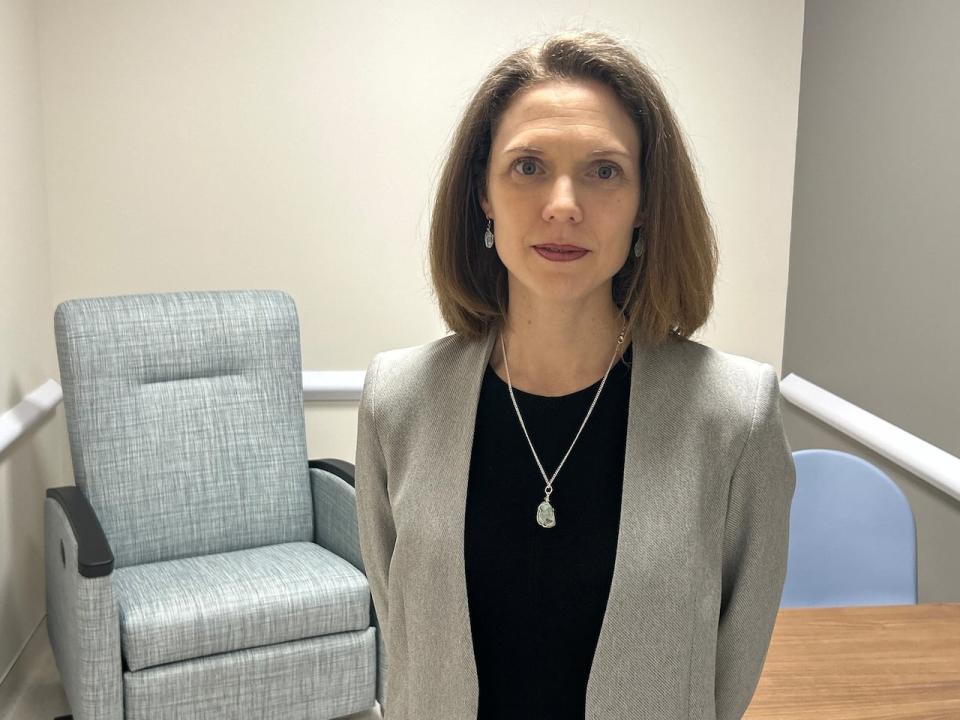P.E.I.'s new mental health and addictions ER adapting to meet demand

Nearly three weeks after it opened, people seeking treatment at the new mental health and addictions emergency room in Charlottetown are often still waiting in the regular ER at the Queen Elizabeth Hospital.
The mental health and addictions ER, a separate space dedicated to treating people in a mental health or addictions crisis, is in the same building as the QEH's emergency department.
It opened Feb. 27 and is staffed 24 hours a day, seven days a week.
"We saw a lot of folks coming in who were in a crisis state who had a pretty pretty high level and pretty complex level of needs," said Rebecca Jesseman, executive director of mental health and addictions for Health P.E.I.
"We need to do a lot more coordination in terms of providing people with access to beds, and sometimes that means they're waiting longer for that access."

Rebecca Jesseman, executive director of mental health and addictions for Health P.E.I., says the team at the new ER is making some changes to better serve people. (Laura Meader/CBC)
The demand for mental health and addictions services had increased even before the new ER opened, she said.
That means it was common over the past few weeks to have mental health clients waiting in the regular QEH ER.
The wait times depended on the clients' needs and how busy the new ER was, Jesseman said, and some only had to wait for a short time.
Some clients, however, had to wait close to 24 hours to be seen, she said.
'Adapt and problem-solve'
Jesseman said hospital staff are looking at using the space in the new ER differently so clients who are more stable can wait on the mental health side instead of in the regular emergency room.
They are also changing the way staff move between the two ERs to hopefully have clients seen sooner.
"We need to adapt and problem-solve so that we can deal with surges like this more effectively in the future," Jesseman said.
Right now, the mental health and addictions ER has the capacity to see seven clients at one time.
Jesseman said many people coming to the new ER are in crisis, including those with thoughts of suicide, depression, anxiety, panic attacks, substance use issues, or people experiencing psychosis associated with schizophrenia.
'Treated with respect'
Ellen Taylor, a mental health and addictions advocate on P.E.I., says she's heard from about six people who've been to the new ER and had positive experiences.
"They were treated with respect and they felt like they were really heard and not rushed through," said Taylor.
She heard people were given choices about their treatment and where to access services — a different approach than in the regular ER.
"Before, I feel like it was like, 'This is all we can do for you.'"

Ellen Taylor, a mental health and addictions advocate on P.E.I., says she's heard positive things about the new mental health and addictions ER. (Stacey Janzer/CBC)
Often, people struggling with mental illness are hesitant to go to the regular ER, said Taylor.
That's why she thinks having this type of facility is so important.
"The more people hear about it being a good experience, then the more people will go to it," said Taylor.
The high demand at the new ER means Health P.E.I. needs to continue to expand the services it's offering, Jesseman said.
That demand could be due to a number of factors, she said, including the time of year, P.E.I.'s population growth and the fact that some people might feel more comfortable coming to the new facility.
Short-stay unit slated for spring
Despite the challenges, Jesseman said it's been exciting to work in a new way at the ER.
"I'm still very confident that we have the right model and that this is making a great difference in our capacity for client care and access to appropriate services," she said.
"I heard a great success story within the first couple of days of opening of somebody who came onto the unit, was assessed and discharged to appropriate community services within 45 minutes."
Health P.E.I. will open a new mental health short-stay unit in the same building, tentatively slated for late spring, though Jesseman said that will depend on staffing.
That unit will be for patients who need to be admitted for 72 hours or less. It will have four patient rooms and two transition rooms.

 Yahoo News
Yahoo News 
